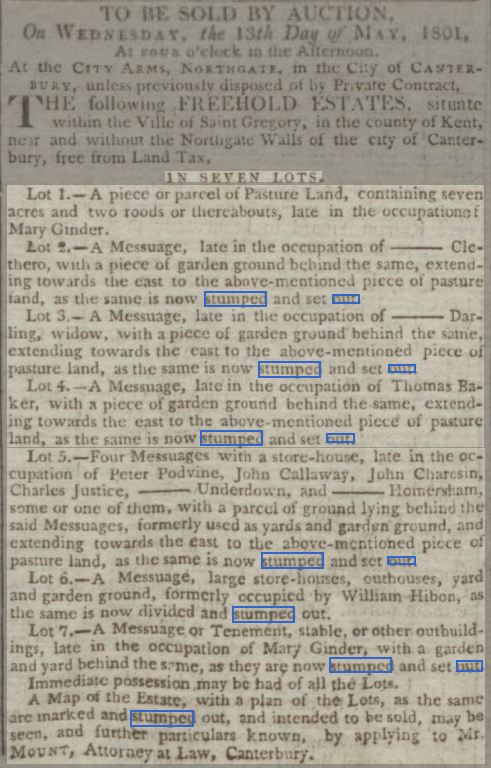Possible Influence
As your question suggests, direct analogy with the earlier 'pay up' may have contributed to the development of 'stump up'. OED gives attestations as early as 1434 for a transitive sense of 'pay up', that is, "to settle in full … to come up with (money) in payment" (to pay up, trans., 1a, OED). For the intransitive sense,
to pay up
1. .... b. intr. To hand over or come up with money as payment; to settle a debt.
Now frequently with implications of unwillingness or compulsion.
the earliest attestation in OED is 1617.
As OED notes about the intransitive use of 'pay up', both the intransitive and transitives uses of 'stump up' frequently have "implications of unwillingness or compulsion" or, at the very least, implications of reluctance or difficulty.
Early Uses
Prior to William Carr's 1824 gloss of 'stump' in Horæ Momenta Cravenæ as "to pay down, on the nail", which notably does not record the phrasal verb, Pierce Egan weighed in twice. In his 1823 "revised and corrected" edition of Grose's Classical Dictionary of the Vulgar Tongue, Egan gives definitions of 'stump' as "money" and 'stumped' as "poor, destitute of money". More tellingly, in the 1821 Real Life in London, probably also by Egan, the phrasal verb 'stump up' is glossed directly:
Stump up the rubbish — Meaning she (or he) shall pay or find the money.
The entire phrase glossed by Egan, "stump up the rubbish", reinforces a suggestion merely intimated by the chronology of two senses of to stump up attested in OED, senses 17a and 17b of stump, v.1.
The earlier sense, attested 1599 for 17a, is "pull up by the roots"; for example, land that has been "stumped up" or "stumped out", that is, cleared of underbrush, trees, then stumps and their roots (by a process known as 'stumping' — see following), is consequently ready for sale at a higher price than uncleared land. The later 17b, arising at least chronologically from 17a, and attested 1833 for 17b(a) and 1836 for 17b(b), is the slang sense "to pay down, 'fork out' (money)".
The implications of "fork out" echo in the minor key of reluctance or difficulty the "implications of unwillingness and compulsion" frequently associated with 'to pay up' (sense 1b).
OED equates the transitive sense 10a of stump, v.1 (as attested by use in 1841 from T. Hood, Tale of Trumpet II, in New Monthly Mag. June, 272: "Common prudence would bid you stump it..It's the regular charge At a Fancy Fair for a penny trumpet") with the transitive sense 17b(a), "to pay down, 'fork out'", and equates the intransitive sense 10b, "to pay up...[a]lso with out", attested 1828 by use in Carr's Dialect of Craven (a later edition of Horæ Momenta Cravenæ) with the absolute or intransitive sense 17b(b).
Evidence
Although I could find no evidence that the sense of 'to stump up' with the meaning of "to pay up" transferred from a conjectured practice of putting money on a stump for payment, ample evidence from the period during and prior to adoption of the phrasal verb in the slang sense of "pay up" suggests, rather, that the sense transferred from the laborious practice of 'stumping' ('up' or 'out') land prior to sale.
The process of 'stumping' is described in detail in the 12 Aug 1824 edition of The Morning Chronicle, London:
We pay at present to Government five bushels of wheat per acre upon land clear of brushwood, to make it fit for the plough. The convicts employed in this labour work in larger gangs, under an overseer who has a per centage upon their labour. After they have cut down and burnt off the trees, they burn the stumps out in a very simple and efficacious way, which I never saw nor hear of in Americ. They dig deep round the stump, cover it with dry wood, and over this lay the turf and mould they had dug out, leaving a hole at top, and another at bottom, where they set fire to it, and a strong draught of air thus passing through this species of kiln, the tree root is burnt completely out in a very short period of time; the calcined earth being afterwards strewed over the land as manure.
(Worth an aside is that 'to stump' in the sense of "to cause to be at a loss" probably arose from reference to the "obstruction caused by stumps in ploughing imperfectly cleared land", OED.)
As shown by advertisements for land in the popular press, found throughout the last part of the 1700s and the first part of the 1800s, this 'stumped out' land was so described as ready for sale. For example,

Kentish Gazette, 28 April 1801, p 1.
In this connection, note that OED sense 10b of stump, v.1, that is, "to pay up", which is equated with the slang sense 17b(b) of to stump up, is also attested with "out":
1854 C. J. Lever Dodd Family Abroad xliv. 401 There is no salary at first, so that the Governor must ‘stump out handsome’.
From OED quote collection for stump v.1, sense 10b.

